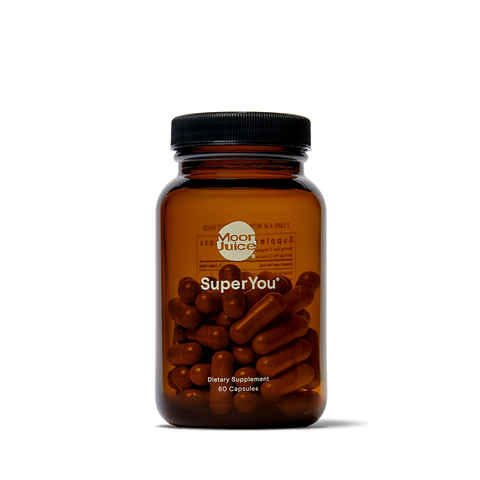Prefer to take a holistic route to achieving your wellness goals? Adaptogens and nootropics are both worthy, natural solutions that can improve some of the most common concerns—think managing stress, improving sleep, and boosting cognitive function. Although the two are often used interchangeably, adaptogens and nootropics aren’t (always) one and the same. At a high level, adaptogens help your body deal with stress and many of its manifestations, while nootropics are more localized to brain function and cognition.
Keep reading to get a better sense of adaptogens vs. nootropics — including how they work, their key benefits, and prime examples of each. Plus: how to choose the right adaptogen or nootropic supplement for your specific needs.
What Are Adaptogens?
Adaptogens are plant extracts that enhance your body's ability to adapt to stressors (hence the name). According to a 2018 review published in Chinese Medical Journal, adaptogens boost resistance to stressful conditions by exerting influence on the immune-neuro-endocrine system and the hypothalamic-pituitary-adrenal (HPA) axis.
As the Cleveland Clinic explains, plants must have 3 specific qualities to have adaptogenic properties:
- It must be non-toxic within a specified therapeutic dose
- It must help your body deal with stress
- It must help your body get back to homeostasis
Examples of adaptogens include but aren’t limited to:
- Rhodiola rosea
- Ashwagandha
- Reishi mushroom
- Panax ginseng (aka Asian ginseng)
- Schisandra
Adaptogens have been traditionally used in Traditional Chinese Medicine (TCM) and Ayurveda for centuries. More recently, these natural substances have been gaining traction in the West — not only in niche wellness circles but also among athletes, researchers, and clinicians. According to a 2021 meta-analysis published in the journal Nutrients, plant adaptogens were first introduced to Western pro athletes about a half-century ago given their potential to improve physical endurance and boost the body’s resilience to external stressors.
Benefits of Adaptogens
Different types of adaptogens will work in unique ways. For instance, some people take Ashwagandha for stress to nourish the adrenal and thyroid glands. The result: renewed vigor and feeling more centered. Others may seek out the benefits of Reishi mushrooms — including emotional well-being and a sharper memory — as this adaptogen is thought to help regulate key hormones involving your mind and mood. That said, most adaptogens typically share a few common benefits.
Above all, adaptogens are best for stress. Stress doesn’t only pique rumination, worrying, and sleepless nights. It can also lead to a cascade of physical effects, such as:
- Surges in cortisol (aka the stress hormone)
- Elevated heart rate
- Digestive distress
- Skin issues
- Free radical damage and accelerated aging
According to the Nutrients meta-analysis cited earlier, adaptogens have also been shown to be beneficial for:
- Chronic fatigue
- Cognitive impairments
- Immune protection
Since adaptogens help the body deal with stressors and bring things back into balance, they’re particularly beneficial to help mitigate symptoms of stress and high cortisol levels. Basically, adaptogens can help you stay afloat when you feel like you’re sinking. (Of course, a healthy diet, solid relationships, self-care, and the like are all crucial to help you feel your best and successfully manage stress. Adaptogen herbs and mushrooms are just one piece of a bigger, holistic puzzle to help you find and maintain your calm.)
What Are Nootropics?
Nootropics (sometimes called “smart drugs” or “cognitive enhancers”) are natural substances that enhance cognition — namely thinking, memory, and learning. According to a 2022 review published in the journal Nutrients, nootropics work by affecting the metabolism of neuronal cells in the central nervous system (CNS). As is the case with adaptogens, its very name is telling: In Greek, nöos means ‘thinking’ and tropein means ‘to guide.’
Examples of nootropics (and plants with nootropic qualities) include but aren’t limited to:
- L-Theanine
- Caffeine
- Panax ginseng
- Ginkgo biloba
- Centella asiatica
- Lion’s mane
- Ashwagandha
- Rhodiola rosea
- Guarana
- Schisandra
- Maca
Yes, some plant extracts — including Ashwagandha and Rhodiola — can count as both adaptogens and nootropics (or nootropic-like). However, not all adaptogens are nootropics, and vice versa.
Benefits of Nootropics
Nootropics are most beneficial to keep your mind sharp. They can support people who feel foggy, fuzzy, and unfocused (think: students before finals and workers on a tight deadline). Nootropics are great when you need clarity of thought and a healthy boost to concentrate.
Specific nootropics will also offer their own unique benefits. For example, L-Theanine may be beneficial for sleeping by boosting GABA levels, enhancing alpha brain waves, and lowering excitatory brain chemicals and hormones. Meanwhile, caffeine (at a moderate intake by those who can tolerate it well) isn’t only beneficial for putting pep in your step. According to a 2023 review published in Critical Reviews in Food Science and Nutrition, the antioxidant and anti-inflammatory compound has been shown to have protective effects on:
- Cardiovascular diseases (CVD)
- Metabolic issues
- Neurodegenerative diseases
- Liver disease
Adaptogens vs. Nootropics: Key Differences
While adaptogens and nootropics are both powerful natural solutions for common wellness woes, they have a few key differences.
Simply put, adaptogenic herbs tackle stress and the domino effect it creates by moderating hormones and other chemicals involved in the stress response. Nootropics sharpen your mind, memory, and focus by enhancing specific neurotransmitters to improve cognitive function. You can think of adaptogens as defenders against stress and ensuing duress in your mind and body, while nootropics give you an extra oomph to push ahead with cognitive and creative potential.
In light of these differences between adaptogens and nootropics, they’re alike in that both:
- Have the ability to improve cognitive function
- Can improve your overall sense of well-being
- Are available to consume in supplements such as powders, capsules, and teas
- Require consistent use to maximize their beneficial effects
Note: Before taking any new supplement — whether adaptogens, nootropics, or otherwise — it’s important to get the all-clear from your medical team. This is even more pertinent if you’re dealing with your own health and wellness concerns. As beneficial as these natural dietary supplements may be in and of themselves, they aren’t one-size-fits-all, and tolerability will vary.
Making the Right Choice for You
To best know if adaptogenic herb compounds or nootropics are right for you, think about your chief wellness goals.
- Are you chronically fatigued, wired at night, or simply can’t seem to keep your stress levels under control? If so, adaptogen supplements may be more up your alley as they’ll help you regulate your stress response on a consistent basis.
- On the other hand, if you want to stay focused on your studies or improve your performance at work, nootropics might be the way to go.
These general FYIs can help you navigate the two at a high level, but it’s definitely worth digging deeper and doing your due diligence. Most importantly, you’ll need to get specific about your concerns and hone in on the right supplement from there. For instance, specific adaptogens and adaptogenic supplements will target stress while supporting other functions like immunity, energy, mental clarity, and skin.

It’s also worth acknowledging that most people have at least a few wellness goals they want to achieve at a given time. Fortunately, adaptogens and nootropics generally pair well together. That said, if you have a few adaptogens or nootropics you want to give a go, the most ideal route is to find a high-quality dietary supplement that mixes the two in one vetted formula. This will give you some built-in insurance, so you don’t have to worry about taking too much or pairing ingredients that don’t play nicely. (After all, one of your goals is likely to reduce stress — not add more to your proverbial plate.) Plus, as we covered above, a given substance can also be adaptogenic and nootropic at the same time.
Moon Juice SuperYou contains four potent adaptogens and nootropics traditionally used in Ayurveda and traditional medicine - Ashwagandha, Shatavari, Rhodiola, and Amla. The powerful adaptogens used in this natural stress relief supplement help alleviate the emotional, mental, hormonal, and physical manifestations of stress.
All things considered, you shouldn’t have to try too hard to get the best of both worlds should you desire them — i.e., strength under stress with clarity and concentration, to boot.
Sources
- PubMed Central. A preliminary review of studies on adaptogens: comparison of their bioactivity in TCM with that of ginseng-like herbs used worldwide. https://www.ncbi.nlm.nih.gov/pmc/articles/PMC6240259/
- Cleveland Clinic. Adaptogens. https://my.clevelandclinic.org/health/drugs/22361-adaptogens
- PubMed. Plant Adaptogens-History and Future Perspectives. https://pubmed.ncbi.nlm.nih.gov/34445021/
- PubMed Central . Nootropics as Cognitive Enhancers: Types, Dosage and Side Effects of Smart Drugs. https://www.ncbi.nlm.nih.gov/pmc/articles/PMC9415189/
- PubMed. Dietary sources, health benefits, and risks of caffeine. https://pubmed.ncbi.nlm.nih.gov/35574653/














